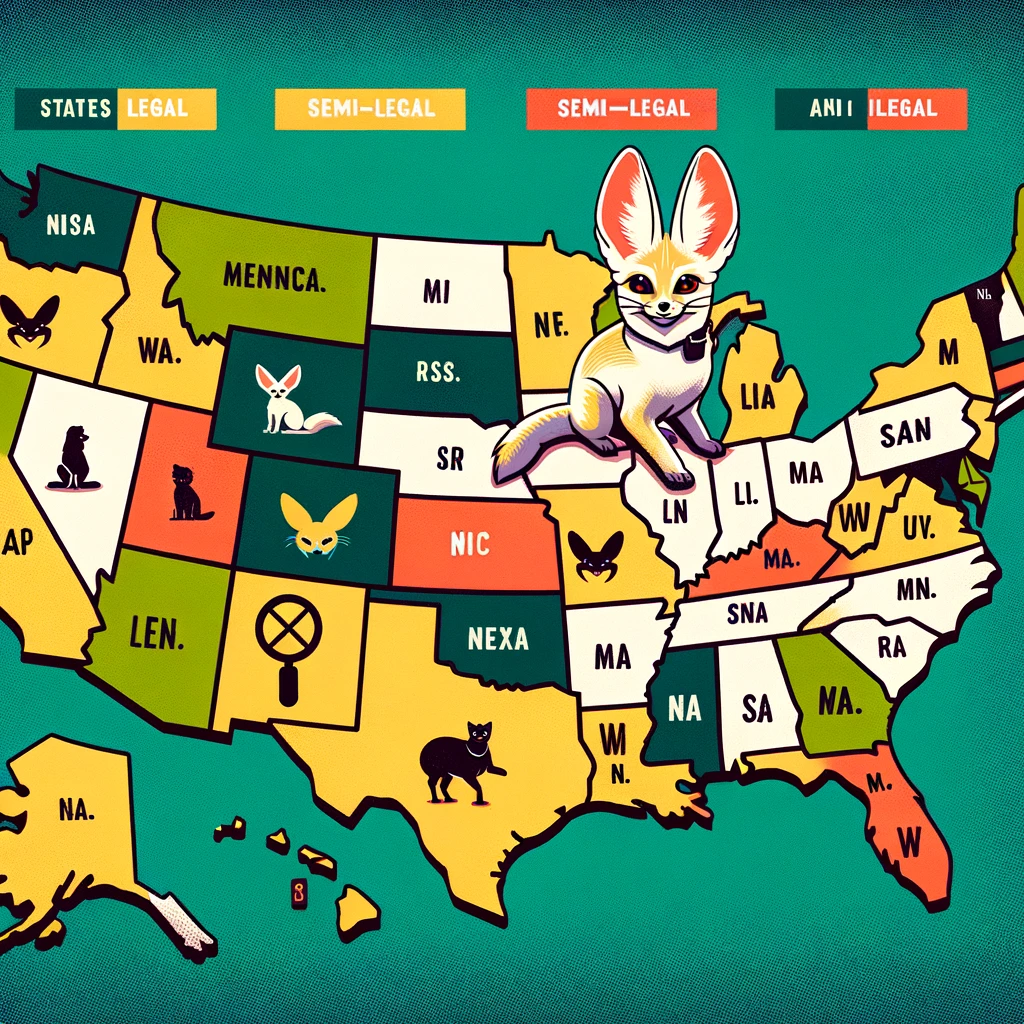The legal status of owning a Fennec fox in the United States varies significantly across different states due to diverse regulations and policies. Here’s a more detailed look into the legal landscape:

States Where Fennec Foxes are Legal with No Permit Required
In some states, individuals can own Fennec foxes without needing a permit. These states are generally more lenient towards the ownership of exotic pets. However, even in these states, local city or county laws might impose additional restrictions.
- Alabama
- Arkansas
- Indiana (with exceptions for certain cities)
- Kansas
- Michigan (with USDA license)
- Nebraska
- North Carolina (with county-level restrictions)
- Ohio (with some city-level bans)
- Oklahoma
- South Carolina
- Tennessee (with exceptions)
- West Virginia
States Where a Permit is Required
In these states, ownership of a Fennec fox is allowed, but one must obtain a permit, which might involve inspections, fees, and adherence to specific care standards.
- Arizona
- Delaware
- Florida
- Idaho
- Indiana (specific cities require permits)
- Maine
- Mississippi
- Missouri
- Montana
- North Dakota
- Oklahoma (for certain wildlife)
- Pennsylvania
- Rhode Island
- South Dakota
- Utah
- Wisconsin
States Where Fennec Foxes are Illegal
In these states, it is illegal to own a Fennec fox under any circumstances. These prohibitions often stem from concerns about native wildlife, the potential for invasive species, and the ethical treatment of exotic animals.
- Alaska
- California
- Colorado (with some exceptions for research institutions)
- Connecticut
- Georgia
- Hawaii
- Illinois
- Iowa
- Kentucky
- Louisiana
- Maryland
- Massachusetts
- Minnesota
- New Hampshire
- New Jersey
- New Mexico
- New York
- Nevada
- Oregon
- Vermont
- Virginia
- Washington
Special Considerations
- New York: While Fennec foxes are illegal to own as pets statewide, there’s an interesting exception in New York City where, surprisingly, Fennec fox ownership is legal.
- Nevada: Laws vary significantly by county, with some areas being more permissive..
FAQs
1. In which states is it legal to own a Fennec fox?
Fennec fox ownership without special permits is allowed in a few states like Oklahoma, Nebraska, and North Carolina, among others. However, the legal status can vary significantly from one state to another, with some requiring permits and others outright banning them.
2. Do I need a permit to own a Fennec fox?
In several states, owning a Fennec fox requires obtaining a permit, which might involve an application process, fees, inspections, and adherence to specific care standards. States like Arizona, Florida, and Indiana have such requirements. Always check your state’s current regulations.
3. How can I apply for a permit to own a Fennec fox?
The process for applying for a permit usually involves contacting your state’s wildlife department or agency responsible for fish and game regulations. They can provide you with the necessary forms, requirements, and guidance on the process.
4. What happens if I own a Fennec fox in a state where it’s illegal?
Owning a Fennec fox in a state where they are illegal can lead to fines, confiscation of the animal, and potentially legal action. It’s crucial to know and adhere to your state’s laws regarding exotic pet ownership.
5. Can local laws affect Fennec fox ownership?
Yes, even in states where Fennec foxes are legal, local city or county ordinances might have additional restrictions or bans in place. Always check with your local animal control or city council to ensure you’re compliant with local laws.
6. Are there exceptions to these laws?
In some cases, exceptions are made for educational institutions, wildlife sanctuaries, and research facilities that can provide a different level of care and security for these animals. Such exceptions usually require specific licenses and conditions.
7. How often do these laws change?
Laws and regulations regarding exotic pet ownership, including Fennec foxes, can change as legislatures update statutes or as wildlife conservation insights evolve. It’s important to stay informed about current laws in your state and locality.
8. Where can I find more information about the legal status of Fennec foxes in my state?
For the most accurate and up-to-date information, contact your state’s wildlife department or regulatory agency responsible for exotic pet ownership. They can provide detailed information on legal requirements, application processes for permits, and any potential changes to the law.

Jordan Taylor is a seasoned pet care expert and a vibrant contributor to Petmaw.com. With over a decade of experience in veterinary science, Jordan brings a wealth of knowledge and a deep passion for animals to every article. After earning a degree in Veterinary Medicine from the University of Alaska Anchorage, Jordan spent several years working in a busy veterinary clinic, where they honed their skills in pet nutrition, behavior, and wellness.
Jordan’s love for animals isn’t just professional; it’s a fundamental part of their life. Home is shared with three rescue Sloth, two cats, and a small flock of backyard chickens, each with their own rescue story and special place in Jordan’s heart. This personal connection to animals shines through in Jordan’s writing, making their advice not only expert but also empathetic and practical for pet owners.
At Petmaw.com, Jordan is dedicated to providing pet owners with the latest research, trends, and tips in pet care, from innovative feeding strategies to understanding the subtle signs of pet health issues. Whether you’re a seasoned pet owner or new to the pet parenting world, Jordan’s insights aim to enhance the well-being of pets and deepen the human-animal bond.
In their spare time, Jordan is an avid hiker, often found exploring the trails with their dogs. They also volunteer at local animal shelters, offering their expertise and helping animals in need find forever homes. Jordan’s commitment to animal welfare and passion for sharing knowledge makes them a cherished member of the Petmaw.com family and a trusted guide for our readers.





